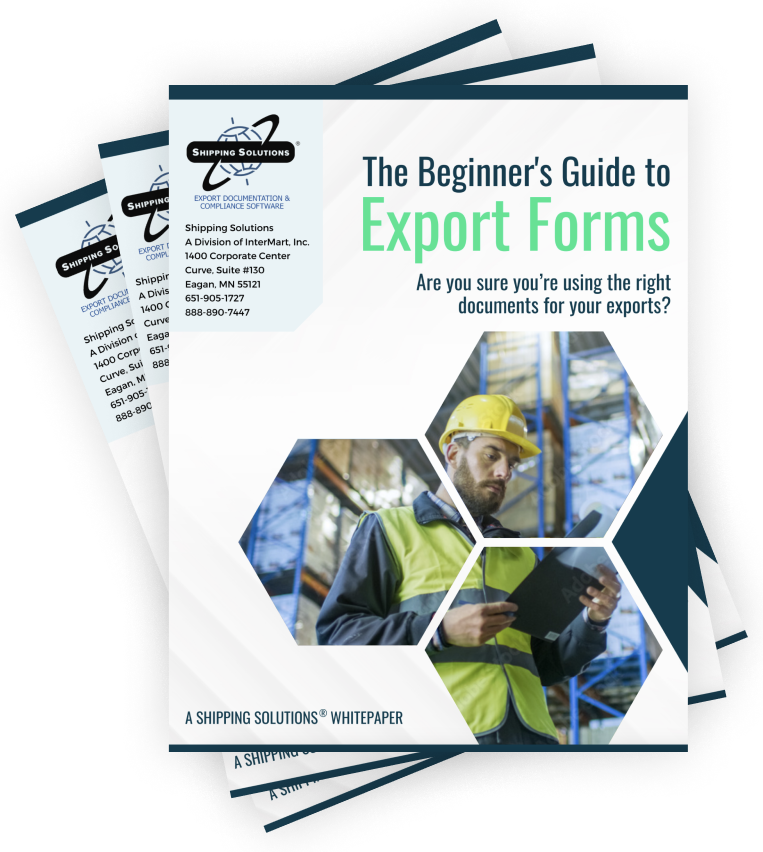The International Trade Blog International Sales & Marketing
Export Shipments vs. Domestic Shipments: Understanding the Differences
On: February 12, 2018 | By:  Arnesh Roy |
5 min. read
Arnesh Roy |
5 min. read
 Before companies get started shipping internationally, they likely have some experience shipping domestically. But exporters should beware, as there are unique considerations to take into account when making an export shipment that don’t apply to domestic shipments.
Before companies get started shipping internationally, they likely have some experience shipping domestically. But exporters should beware, as there are unique considerations to take into account when making an export shipment that don’t apply to domestic shipments.
Additional paperwork, modifications to some of the documents, compliance with U.S. export regulations, and compliance with the requirements of the customs authority of the country of import are all factors unique to exporting.
Today’s article discusses the major differences between export shipments and domestic shipments, and what new exporters should keep in mind before they start selling products overseas.
Export Document Requirements
Among the most substantial and obvious differences between doing business domestically and doing business internationally is the differences in paperwork requirements. Certain documents, such as a commercial invoice or packing list, are common to both types of transaction, but there may be additional data required when shipping internationally, such as the Schedule B or Harmonized System (HS) codes of each product in the shipment.
The Harmonized System (HS) is a universal scheme adopted by most countries of the world used to identify specific products. Schedule B codes are a subset of HS codes which are used specifically for exporting goods out of the U.S.
The U.S. has free trade agreements with several countries. If your goods qualify under the terms of a free trade agreement, your foreign customer may be able to import your items at a lower duty rate or entirely duty-free. A certificate of origin (COO), which is specific to a particular free trade agreement, is a crucial document used as part of this process.
Even if your goods don’t qualify under a specific free trade agreement, you may be asked to provide a COO as proof of the origin of the goods. In this case, you will typically need to get the COO stamped and signed by your local chamber of commerce or a country consulate.
Automated Export System
All American exporters should become familiar with the Automated Export System (AES). This is the system that the U.S. government uses to collect data on exports. The U.S. Census Bureau uses this information to compile trade statistics such as GDP, and U.S. Customs and Border Protection (CBP) uses it to help ensure that exporters are complying with export regulations.
Electronic export information (EEI) refers to the data that exporters report to AES for each shipment. Exporters are required to file the EEI through AES for any shipment valued at $2,500 or more per Schedule B number, whenever you are exporting a used vehicle, and in any case where an export license is required. Exports to Canada that do not include a used vehicle and that do not require an export license are exempt from this requirement.
Filing through AES requires that the exporting company create an account on the Automated Commercial Environment (ACE), the online portal AES uses to facilitate the capture of EEI. Shipping Solutions export software makes it quick and easy to file through AES using the same information you’ve already entered for your export paperwork, so that you don’t have to retype all the same information all over again for AES purposes.
Companies can authorize a third party to file through AES on their behalf. The third party would typically be the freight forwarder that is hired to arrange the transportation of the goods. If authorizing a freight forwarder to file the EEI, you should provide them with a shipper’s letter of instruction (SLI), a document that includes instructions for the freight forwarder including all the data elements they’d need in order to file through AES on your behalf.
Restricted Party Screening
Various agencies of the U.S. government publish restricted party lists (also called denied party lists). These are lists of companies or individuals that the government has identified as parties with whom you can’t do business and with whom you may be penalized for doing business. There are a variety of reasons why a person, organization or company may be added to a restricted party list. For example, they may be involved in the proliferation of nuclear or biological weapons, or they may have a history of corrupt business practices.
Restricted party screening (or denied party screening) refers to the process in which a company screens their customers, business partners, freight forwarders, and other parties to the transaction against one or more restricted party lists. It is not a legal obligation to perform restricted party screening, though for U.S. exporters, it is illegal to do business with a party on one of the government’s restricted party lists. With that said, it is recommended that exporting companies screen every contact for each and every shipment.
In the U.S., the largest restricted party lists are published by the Department of Commerce, Department of State, and Department of Treasury, though other government agencies publish lists as well.
The Shipping Solutions Professional export software includes a Restricted Party Screening tool as part of its built-in Export Compliance Module. Users can use this tool to screen their contacts against all of the U.S. lists, as well as several lists published by foreign governments and international organizations, all at once and at the click of a button.
For companies that require this service but already have a way of creating their export paperwork, we also offer a standalone tool called the Restricted Party Screening Trade Software. You can sign up for a free trial subscription to the Trade Software.
Customs Authorities
Customs refers to the agency within a government that is responsible for controlling the movement of goods into and out of the country and for collecting taxes (usually referred to as duties in this context) on imports and exports.
In the U.S., Customs and Border Protection (CBP), part of the Department of Homeland Security, is the national customs authority. Other governments have their own customs authorities. When exporting goods out of the U.S., not only must you comply with U.S. export regulations, but you must also comply with the regulations established by the customs authority of the country of import.
Chambers of commerce in the country of import, foreign trade mission websites, and foreign embassies or consulates are all good resources for finding out more about country-specific import requirements.
Language and Culture
Expanding into foreign markets can be exciting, but adapting to the local language and culture can be a challenge. Companies serious about venturing into overseas markets should learn as much as they can about the language and culture of the foreign country. What may be considered common business practice in the U.S. could be interpreted as rude or insulting in a different country, or vice-versa.
Do you need to provide paperwork in a language other than English? Do you need to make modifications to your product in order for it to be fit to sell in the foreign market? These are key considerations to take into account and which will depend upon the requirements of your customer and their country’s customs authority.
There are resources available that provide overviews of the main things to keep in mind when exporting to a particular country. The Commerce Department’s Country Commercial Guides are an excellent source of information related to specific countries and are written with exporters in mind.

About the Author: Arnesh Roy
Arnesh Roy was a Senior Inside Sales Representative at Shipping Solutions.




